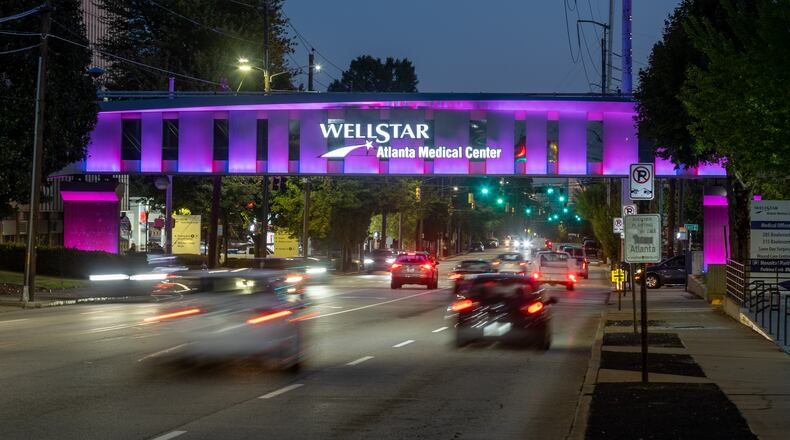Facing withering criticism for shuttering two Atlanta hospitals, the Wellstar Health System said Wednesday that local leaders were simply trying to score “cheap political points” by assailing the decisions instead of working to keep medical facilities open.
The scathing response from Wellstar came a week after Fulton County Commission Chair Robb Pitts and other Democratic leaders filed complaints asking federal regulators to probe Wellstar’s nonprofit status and investigate whether it violated civil rights protections.
In its sharpest response yet to the backlash, Wellstar said its effort to find “another health system partner and work with government officials to find a solution” started more than two years before it announced it would shut down the Atlanta Medical Center.
“This included direct discussions with policymakers in Fulton County, including Chairman Pitts as early as February 2020,” Wellstar said. “Unfortunately, local policymakers declined to provide any support to AMC as they rightly have and do with the other safety net hospital in Atlanta.”
Credit: Natrice Miller/AJC
Credit: Natrice Miller/AJC
That’s a reference to Grady Memorial Hospital, the downtown Atlanta facility that is owned jointly by DeKalb and Fulton counties. State and county governments have directed $130 million to Grady for new beds and expanded services, but the extra funding is not expected to fully meet the needs created by Wellstar’s AMC closures.
Pitts and his allies accused Wellstar of engaging in “healthcare redlining” by closing two facilities in majority-Black communities — Atlanta Medical Center in downtown and Atlanta Medical Center South in East Point — while exploring more profitable ventures in affluent, mostly white areas.
The finger-pointing comes as Wellstar tries to navigate prickly new political terrain surrounding its possible takeover of the Augusta University Healthcare System, which is receiving $105 million in taxpayer funds to upgrade its medical records system.
State Rep. Kim Schofield, D-Atlanta, said Wellstar struck “side deals” to pave the way for a new hospital in a wealthier neighborhood on the outskirts of Augusta after leaving underserved communities in a lurch.
“It’s a blatant, blatant action for discrimination and it won’t be tolerated. Wellstar took their resources and left our community scarred,” Schofield said. “We are committed to holding Wellstar accountable. You won’t get away with this one.”
And on Wednesday, the Fulton County Commission adopted a resolution supporting the federal inquiries into Wellstar after a contentious back-and-forth. One commissioner accused Bridget Thorne, the sole opponent of the resolution, of delivering a “paid advertisement” for Wellstar.
‘A very tough decision’
The closure of the Atlanta Medical Center last year instantly became a rallying cry for Democrats who said it was an urgent example of the need to expand Medicaid, and fierce backlash from local officials who said they were left in the dark about the plans.
Credit: TNS
Credit: TNS
Wellstar said the mounting costs of treating uninsured and underinsured patients had taken a toll, but it was “outrageous and false” to claim its actions were discriminatory. It said it pumped roughly $350 million into Atlanta Medical Center in recent years, but was still awash in red ink.
“It was not financially sustainable,” Wellstar’s general counsel, Leo Reichert, told a legislative committee last month of the hospital’s $107 million in losses last year. “Unfortunately, we had to make a very tough decision in that one market.”
In the statement, Wellstar argued that it shouldn’t face retribution for shuttering the underfunded hospital.
“These difficult circumstances and ongoing community discussions should not give license to some politicians to attack an entire healthcare system — home to 24,000 team members and caregivers — to score cheap political points,” it read.
As a large hospital system, Wellstar has said it is the the largest provider of charity care in the state, treating uninsured and underinsured patients at its other hospitals. In addition, experts agree it would have taken large sums of money to transform AMC into a modern, attractive facility.
Credit: Miguel Martinez
Credit: Miguel Martinez
State Sen. Nan Orrock, who was among the Democrats who called for the federal inquiries, bristled at the health system’s pushback. She said Wellstar was trying to “point fingers at elected officials” rather than addressing the federal complaints.
One complaint asks the Internal Revenue Service to investigate whether Wellstar should maintain its nonprofit status, a charity designation that relieves the hospital system from having to pay federal, state and local taxes.
The second asks the U.S. Department of Health & Human Services to determine whether the closures violate a provision of the federal Civil Rights Act, and if so, to make Wellstar “redress the harm to the community.”
“They need to come clean about what they’ve done. The harm that they’ve caused is accurately documented in our complaints, and federal authorities are going to investigate,” Orrock said.
“Closing down hospitals is not a strategy to meet the needs of the community. All we hear from Wellstar is that they were trying to sell the hospital. But that’s not the only choice they had.”
Staff Writer Jim Gaines contributed to this report.
About the Author
Keep Reading
The Latest
Featured




